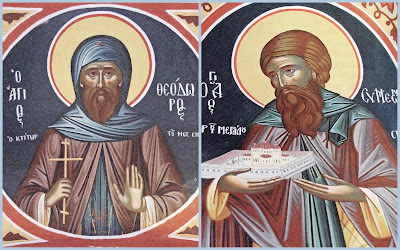By St. Dimitri of Rostov
During the last, difficult
times, when with the increase of our sins our perils have also
increased, in fulfillment of the words of the holy apostle Paul: In
perils of waters, in perils of robbers, in perils by mine own
countrymen, in perils by the heathen, in perils in the city, in perils
in the wilderness, in perils in the sea, in perils among false brethren (2 Cor. 11:26), when in fulfillment of the words of the Lord Himself, nation
shall rise against nation, and kingdom against kingdom: and there shall
be famines, and pestilences, and earthquakes, in divers places
(Matt. 24:7), when we are pressed with invasions by foreign nations,
civil wars, and fatal diseases, the Most Holy and Most blessed Virgin
Mary, the Mother of the Lord, gives us her protection as our shield, in
order to free us from all disasters; in order to protect us from
famines, floods, and earthquakes, to save us from wars and diseases, and
preserve us unharmed under her protection. A sign of this protection
appeared in the royal city of Constantinople during the reign of the
pious King Leo the Wise in the glorious church of the Most Holy
Theotokos in Blachernae. There during the All-Night Vigil for Sunday, on
the first day of the month of October, in the fourth hour of the night,
in the presence of many people, St. Andrew the fool for Christ lifted
up his eyes and saw the Heavenly Queen, the Protectress of the whole
world, the Most Holy Virgin Theotokos, standing in the air and praying,
shining with the light of the sun and covering the people with her
honorable omophorion. Seeing this, St. Andrew said to his disciple
Blessed Ephiphanios:














































